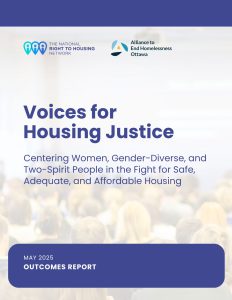Background
In October 2024, the National Right to Housing Network (NRHN), in partnership with the Alliance to End Homelessness Ottawa, convened an in-person community gathering focused on claiming the right to housing for women, gender-diverse, and Two-Spirit people.
This gathering provided a space for rights-claimants, advocates, and lived experts to share knowledge with one another, strengthen collective strategies, and build momentum for engaging in the Neha review panel, which will examine the right to safe, adequate, and affordable housing for women, Two Spirit, Trans, and gender-diverse people, and the government’s duty to uphold this right.
These conversations continued at the National Conference on Ending Homelessness (CAEH24), which was also held in Ottawa in October 2024, where we facilitated further discussions on systemic housing injustices, explored policy solutions, and strengthened coordination across civil society. The insights shared by community members, particularly those with lived expertise, reinforced the urgent need for rights-based, community-driven solutions that prioritize those most affected in decision-making processes within housing policy.
As the housing crisis continues to deepen without sufficient government action, the insights and demands shared at this gathering highlighted the urgent need for a rights-based approach to housing policy.
Participants emphasized that housing precarity is deeply tied to gender-based violence, income insecurity, discriminatory policies, and the criminalization of survival strategies.
– Outcomes Report, 2025
A Vision for the Future
Participants of these in-person gatherings shared a vision of a future where:
- Housing is safe, affordable, adequate, and accessible for all;
- Communities play an active role in preventing and addressing homelessness;
- Stigma is dismantled, shifting the focus from individual blame to systemic accountability;
- Governments invest in real solutions—housing, mental health supports, and harm reduction, rather than crisis management; and,
- Lived experts lead the movement, recognized as essential decision-makers and compensated fairly.
At the same time, participants spoke to urgent challenges that persist: Severe housing shortages, skyrocketing rents, and mass evictions that continue to displace communities; Weak tenant protections, combined with a lack of enforcement, make it difficult for people to remain housed; The criminalization of sex work and drug/substance use, which creates additional barriers to housing security; Migrants being routinely excluded from essential housing services, while failing social supports—including Ontario Disability Support Program (ODSP) and Ontario Works (OW) limitations and inadequate gender-responsive services—leave many people without viable options.
Participants called for concrete, immediate policy shifts to address these systemic failures. Stronger rent controls, protections against renovictions, legal recognition of rental-geared-to-income (RGI) housing as a right, and more. Read the full Outcomes Report which breaks down the challenges, solutions, and advocacy opportunities that emerged from these discussions.
Thank you to the Ottawa Community Foundation for generously funding this work!



